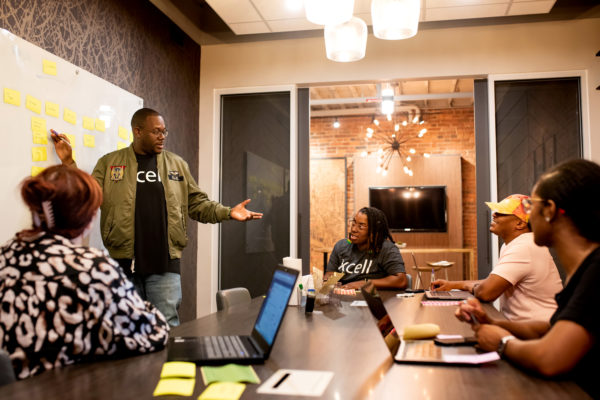Thanks to a U.S. Census Bureau initiative, a Baltimore-based digital services company is creating tech to help government agencies find infrastructure funding.
The Opportunity Project (TOP) is a program that invites companies to apply and volunteer to solve problems facing the federal government. Think of what Code for Baltimore does for the individual trying to break into the tech industry, but for companies trying to make connections in the federal contracting space.
TOP operates through the Census Bureau’s Census Open Innovation Labs and pairs government agencies like the Departments of Commerce and Labor with outside technologists and companies. They then work in 12-week sprints to develop solutions for challenges the government encounters.
XCell, a participant in the civic tech incubator Hutch, is working through TOP to create a digital tool that uses open data. The tech is designed to help state, local, tribal and territorial governments navigate potential grant opportunities enabled by the Bipartisan Infrastructure Law’s $550 billion investment in infrastructure.
“We want to make sure that we are leaving a lasting impact into our bigger, broader community,” Felix Gilbert, founder of XCell, told Technical.ly about the company’s involvement in TOP. “We’re involved because we want to lean in. I’ve seen challenges personally, in regards to infrastructure and funding and technology.”
Gilbert sees the last project his late father worked on in 2021, with Project Moxie, in the work he’s doing now. His father built tiny home communities in Aurora, Colorado as affordable housing to combat homelessness. The tech solution Gilbert’s creating now could be used to get funds to more cities like Aurora, which may not have the in-house staff or bandwidth to apply for these infrastructure funds.
Through the program, Gilbert is also working directly with the White House Office of Science and Technology Policy, as well as subject matter experts like White House data scientists. Although the program is entirely volunteer-based and unpaid, the connections are priceless. It also allows companies to prove the impact of a product on a known agency issue, or develop a prototype together with a primary client.
That said, the program does not guarantee a government contract. Gilbert says that if you’re looking for a guaranteed paid government contract, this isn’t the program for you. From his perspective, it’s best to go into the program with a mindset of wanting to give back to the community. For instance, maybe go into the program trying to determine if a software solution or product is viable in the market. The program can then assist through the connection of industry mentors to help find funding for that future product.
“We’re a small company who had no clue we would be connected to the White House in the infancy of our growth,” Gilbert said. “Check [TOP] out. It’s an opportunity for you to get in and flex your muscles. [You] might even be able to pull out a proof of concept. Show the federal government how we can solve some of their problems through tech and software development.”
Donte Kirby is a 2020-2022 corps member for Report for America, an initiative of The Groundtruth Project that pairs young journalists with local newsrooms. This position is supported by the Robert W. Deutsch Foundation.Join the conversation!
Find news, events, jobs and people who share your interests on Technical.ly's open community Slack

Delaware daily roundup: Delmarva Power vendor stats; DelDOT's $15M federal grant; 50 best companies to work for

Delaware daily roundup: Over 4,000 Black-owned businesses uncovered; Dover makes rising cities list; a push for online sports betting

Philly daily roundup: Women's health startup wins pitch; $204M for internet access; 'GamingWalls' for sports venues


